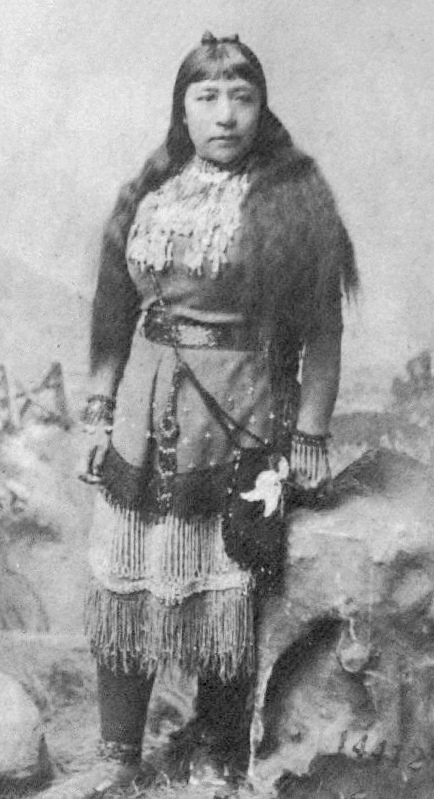Sarah Winnemucca
 Sarah (née Winnemucca) Hopkins ( – October 17, 1891) was a Northern Paiute writer, activist, lecturer, teacher, and school organizer. Her Northern Paiute name was Thocmentony, also spelled Tocmetone, which translates as "Shell Flower."
Sarah (née Winnemucca) Hopkins ( – October 17, 1891) was a Northern Paiute writer, activist, lecturer, teacher, and school organizer. Her Northern Paiute name was Thocmentony, also spelled Tocmetone, which translates as "Shell Flower."Sarah Winnemucca was born near Humboldt Lake, Nevada, into an influential Northern Paiute family who led their community in pursuing friendly relations with the arriving groups of Anglo-American settlers. She was the daughter of Chief Winnemucca of the Paiute nation and the granddaughter of Chief Truckee. At 16, Sarah studied at a Catholic school in San Jose, California. When the Paiute War erupted between the Pyramid Lake Paiute and the settlers, including some who were friends of the Winnemucca family, Sarah and some of her family traveled to San Francisco and Virginia City to escape the fighting. They made a living performing onstage as "A Paiute Royal Family." In 1865, while the Winnemucca family was away, their band was attacked by the U.S. cavalry, who killed 29 Paiutes, including Sarah's mother and several members of her extended family.
At 27, Sarah began working in the Bureau of Indian Affairs at Fort McDermit in 1871 as an interpreter. Subsequently, Winnemucca became an advocate for the rights of Native Americans, traveling across the U.S. to tell Anglo- Americans about the plight of her people. When the Paiute were interned in a concentration camp at Yakima, Washington after the Bannock War, she traveled to Washington, D.C. to lobby Congress and the executive branch for their release. She also served U.S. forces as a messenger, interpreter, and guide, and as a teacher for imprisoned Native Americans.
Winnemucca published ''Life Among the Piutes: Their Wrongs and Claims'' (1883), a book that is both a memoir and history of her people during their first 40 years of contact with European Americans. It is considered the "first known autobiography written by a Native American woman." Anthropologist Omer Stewart described it as "one of the first and one of the most enduring ethnohistorical books written by an American Indian," frequently cited by scholars. Following the publication of the book, Winnemucca toured the Eastern United States, giving lectures about her people in New England, Pennsylvania, and Washington, D.C. She returned to the West, founding a private school for Native American children in Lovelock, Nevada.
Since the late 20th century, scholars have paid renewed attention to Winnemucca for her accomplishments. In 1993, she was inducted posthumously into the Nevada Writers Hall of Fame. In 2005, the state of Nevada contributed a statue of her by sculptor Benjamin Victor to the National Statuary Hall Collection in the U.S. Capitol.
Winnemucca's legacy has been controversial. Some biographers have wished to remember her primarily for her activism and social work to better the conditions for her people, while others have criticized her for her tendency to exaggerate her social status among the Paiute. Among the Paiute, her assistance to the U.S. military at a time when they were at war with the Paiute has been criticized, as has her advocacy for assimilation of Natives to Anglo-American culture. Still, Paiute have also recognized her social work and activism for Indigenous rights. Provided by Wikipedia

